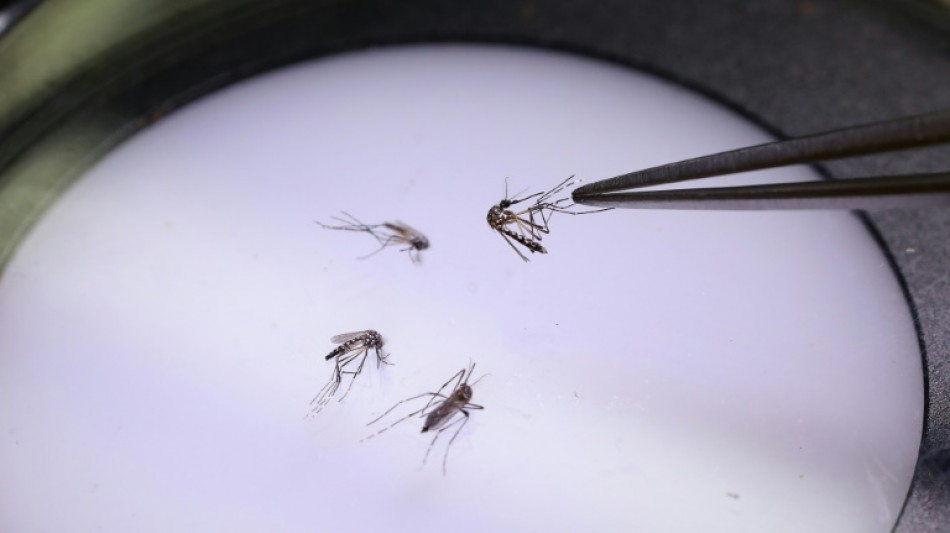
-
 Pedro double fires Chelsea into Champions League last 16, dumps out Napoli
Pedro double fires Chelsea into Champions League last 16, dumps out Napoli
-
US stocks move sideways, shruggging off low-key Fed meeting

-
 US capital Washington under fire after massive sewage leak
US capital Washington under fire after massive sewage leak
-
Anti-immigration protesters force climbdown in Sundance documentary

-
 US ambassador says no ICE patrols at Winter Olympics
US ambassador says no ICE patrols at Winter Olympics
-
Norway's Kristoffersen wins Schladming slalom

-
 Springsteen releases fiery ode to Minneapolis shooting victims
Springsteen releases fiery ode to Minneapolis shooting victims
-
Brady latest to blast Belichick Hall of Fame snub

-
 Trump battles Minneapolis shooting fallout as agents put on leave
Trump battles Minneapolis shooting fallout as agents put on leave
-
SpaceX eyes IPO timed to planet alignment and Musk birthday: report

-
 White House, Slovakia deny report on Trump's mental state
White House, Slovakia deny report on Trump's mental state
-
Iran vows to resist any US attack, insists ready for nuclear deal

-
 Colombia leader offers talks to end trade war with Ecuador
Colombia leader offers talks to end trade war with Ecuador
-
Former Masters champ Reed returning to PGA Tour from LIV

-
 US Fed holds interest rates steady, defying Trump pressure
US Fed holds interest rates steady, defying Trump pressure
-
Norway's McGrath tops first leg of Schladming slalom

-
 Iraq PM candidate Maliki denounces Trump's 'blatant' interference
Iraq PM candidate Maliki denounces Trump's 'blatant' interference
-
Neil Young gifts music to Greenland residents for stress relief

-
 Rubio upbeat on Venezuela cooperation but wields stick
Rubio upbeat on Venezuela cooperation but wields stick
-
'No. 1 fan': Rapper Minaj backs Trump

-
 Fear in Sicilian town as vast landslide risks widening
Fear in Sicilian town as vast landslide risks widening
-
'Forced disappearance' probe opened against Colombian cycling star Herrera

-
 Seifert, Santner give New Zealand consolation T20 win over India
Seifert, Santner give New Zealand consolation T20 win over India
-
King Charles III warns world 'going backwards' in climate fight

-
 Minneapolis activists track Trump's immigration enforcers
Minneapolis activists track Trump's immigration enforcers
-
Court orders Dutch to protect Caribbean island from climate change

-
 Sterling agrees Chelsea exit after troubled spell
Sterling agrees Chelsea exit after troubled spell
-
Rules-based trade with US is 'over': Canada central bank head

-
 Lucas Paqueta signs for Flamengo in record South American deal
Lucas Paqueta signs for Flamengo in record South American deal
-
Holocaust survivor urges German MPs to tackle resurgent antisemitism

-
 'Extraordinary' trove of ancient species found in China quarry
'Extraordinary' trove of ancient species found in China quarry
-
Villa's Tielemans ruled out for up to 10 weeks

-
 Google unveils AI tool probing mysteries of human genome
Google unveils AI tool probing mysteries of human genome
-
UK proposes to let websites refuse Google AI search

-
 'I wanted to die': survivors recount Mozambique flood terror
'I wanted to die': survivors recount Mozambique flood terror
-
Trump issues fierce warning to Minneapolis mayor over immigration

-
 Anglican church's first female leader confirmed at London service
Anglican church's first female leader confirmed at London service
-
Germany cuts growth forecast as recovery slower than hoped

-
 Amazon to cut 16,000 jobs worldwide
Amazon to cut 16,000 jobs worldwide
-
One dead, five injured in clashes between Colombia football fans

-
 Dollar halts descent, gold keeps climbing before Fed update
Dollar halts descent, gold keeps climbing before Fed update
-
US YouTuber IShowSpeed gains Ghanaian nationality at end of Africa tour

-
 Sweden plans to ban mobile phones in schools
Sweden plans to ban mobile phones in schools
-
Turkey football club faces probe over braids clip backing Syrian Kurds

-
 Deutsche Bank offices searched in money laundering probe
Deutsche Bank offices searched in money laundering probe
-
US embassy angers Danish veterans by removing flags

-
 Netherlands 'insufficiently' protects Caribbean island from climate change: court
Netherlands 'insufficiently' protects Caribbean island from climate change: court
-
Fury confirms April comeback fight against Makhmudov

-
 Susan Sarandon to be honoured at Spain's top film awards
Susan Sarandon to be honoured at Spain's top film awards
-
Trump says 'time running out' as Iran rejects talks amid 'threats'


Invasive species cost trillions in damages: study
From river-clogging plants to disease-carrying insects, the direct economic cost of invasive species worldwide has averaged about $35 billion a year for decades, researchers said Monday.
Since 1960, damage from non-native plants and animals expanding into new territory has cost society more than $2.2 trillion, 17 times higher than previous estimates, they reported in the journal Nature Ecology & Evolution.
The accelerating spread of invasive species -- from mosquitoes to wild boar to tough-to-eradicate plants -- blights agriculture, spreads disease and drives the growing pace of species extinction.
Earlier calculations based on highly incomplete data were already known to fall far short of reality.
To piece together a more accurate picture, an international team of researchers led by Ismael Soto, a scientist at the University of South Bohemia in the Czech Republic, compiled data on 162 invasive species whose costs have been well documented in at least a handful of countries.
They then modelled the economic impact for 78 other countries such as Bangladesh and Costa Rica, for which no data was previously available.
"We expected an underestimation of invasion costs, but the magnitude was striking," Soto told AFP.
Due mainly to high volumes of trade and travel, tens of thousands of animal and plant species have taken root, sometimes literally, far from their places of origin.
Europe is by far the continent most affected by the phenomenon, followed by North America and Asia.
"Plants were the most economically damaging group, both for damage and management," Soto said. "Cost hotspots include urban coastal areas, notably in Europe, eastern China, and the US."
Animals can cause devastating damage too.
Wild boar, for example, destroy crops, cornfields and vineyards, while mosquitoes -- with expanding ranges due to global warming -- impose direct costs to human health by spreading diseases such as dengue and malaria.
Another example is Japanese knotweed, an invasive plant that is very common in Europe and requires costly eradication programmes.
"Our study is based on only 162 species," Soto noted. "Our figure is probably still an underestimate of a wider problem, and therefore the real economic costs could be even higher."
Using a broader definition -- including indirect costs such as lost income -- the UN's biodiversity expert group, IPBES, has calculated the total cost to society of invasive species at about $400 billion annually.
K.Sutter--VB


